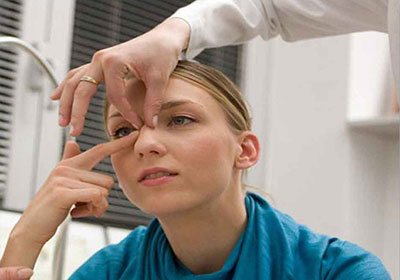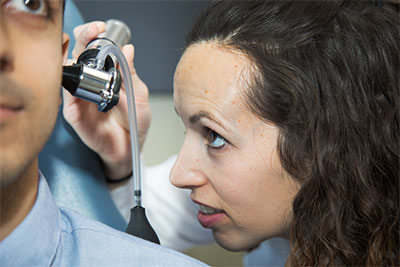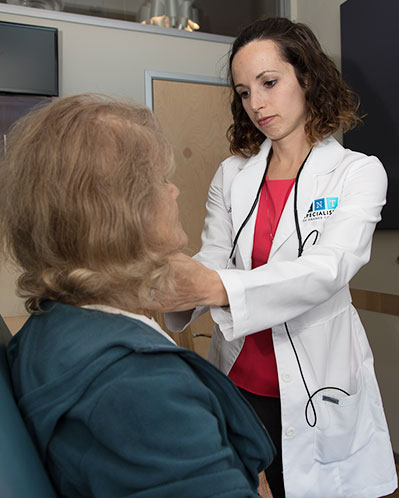Experts in Treating Ear, Nose & Throat Disorders
Our team of specialists have extensive training and experience in treating of ENT conditions. This includes:
Ear – hearing loss, ear infections, dizziness and ringing in the ears (tinnitus)
Nose – allergies, smell disorders, polyps and nasal obstruction due to a deviated septum
Throat – diseases of the throat, larynx (voice box) and voice and swallowing disorders
Head and neck – infections and tumors, facial trauma and deformities of the face

The nasal cavity filters, humidifies, and warms the air that we breathe, and the sinuses are air-filled pockets off the nasal cavity. When the nasal cavity gets blocked, people notice difficulty breathing through their nose and congestion.
When the drainage pathways between the sinuses and the nasal cavity get blocked, the mucous can get trapped in the sinuses and sinus infections can occur. Blockage can be due to variations in anatomy (such as a septal deviation), inflammation, infection, or growths including nasal polyps.
Treatment of nasal and sinus conditions range from sinus irrigations to oral or nasal medications to surgery. Nasal and sinus disorders are very common and can significantly negatively impact one’s quality of life if not treated appropriately.
Here are some of the nasal and sinus conditions we treat:
- Nasal Obstruction
- Allergic and Nonallergic Rhinitis
- Deviated Septum
- Inferior Turbinate Hypertrophy
- Chronic Sinusitis
- Mucocele
- Sinonasal Polyps
- Inverted Papilloma
- Sinonasal Tumors
Problems with voice and speech include difficulty articulating words, difficulty speaking loudly, rough voice, and change in pitch. Most people have experienced some or all of these throughout their lives. These problems can be due to conditions originating from the mouth, tongue, throat, or voice box including the vocal cords. Treatment can be as simple as adjusting behavior and speech therapy to medications and surgery.
Slightly less common are problems affecting swallowing. These often occur in the elderly or in people with neurologic conditions but can also occur in younger and healthier people as well. Treatment varies and is directed at the cause of the problem.
Here are some of the speech, voice and swallowing conditions we treat:
- Hoarse Voice
- Vocal Cord Nodules, Polyps, and Granulomas
- Chronic Laryngitis
- Difficulty Swallowing


The ear is a complex organ that is made up of the outer ear (including the ear you see on the outside and the ear canal), the middle ear (including the ear drum and ear bones), and the inner ear (including the cochlea and balance canals). Signals from these areas are sent back to the brain along nerves. Problems with the ear and hearing can occur at any location along this pathway.
We offer comprehensive evaluation and treatment of this entire pathway. We work to create a safe ear, eliminate bothersome symptoms and sensations, and optimize hearing and communication.
We also offer the latest technology in hearing aids and devices and provide ongoing support to maximize patient success with hearing devices.
Here are some of the hearing and medical ear conditions we treat:
- Hearing Loss
- Tinnitus (ringing in the ears)
- Vertigo and Balance Disorders
- Ear Infections
- Surfer’s Ear
- Ear Drum Perforations
- Otosclerosis
- Cholesteatoma
- Growths and Tumors
Snoring can be more than just an annoyance —it can lead to poor sleep and can be a sign of something more serious. About 90 million Americans suffer from snoring and as many as half of those may have a sleep disorder.
The sound of snoring is caused by vibration of structures in your throat or nose. When structures in these areas collapse to the point of interfering with breathing, we call this obstructive sleep apnea (OSA). OSA is associated with many serious health conditions, including heart disease and even a shortened lifespan. For people who have been unsuccessful with lifestyle changes and CPAP (Continuous Positive Airway Pressure) therapy, there are many surgical options than can help.
Here are some of the procedures we offer to address snoring and sleep conditions:
- Septoplasty
- Functional Rhinoplasty
- Tonsillectomy
- Palate Surgery
- Tongue Base Surgery


Salivary glands are structures that produce saliva. There are 3 sets of major and numerous minor salivary glands. The major salivary glands are located on your cheeks (parotid glands), under your jaw (submandibular glands), and under your tongue (sublingual glands), while the minor salivary glands are found throughout your mouth and throat. The glands are prone to inflammation, infection, stone formation, and growth of tumors (both cancerous and non-cancerous).
Here are some of the salivary gland conditions we treat:
- Masses and Tumors of the Salivary Glands
- Chronic Inflammation of the Salivary Glands
- Salivary Gland Stones
Cancers that originate in the head and neck area (excluding skin, eye, and brain cancers) usually begin in the cells that line the moist, mucosal surfaces of the head and neck (e.g., inside the mouth, nose, and throat). The most common types of cancer of the head and neck are caused by the abuse of alcohol coupled with tobacco use. More recently, we have discovered a growing number of these cancers are caused by infection with the Human Papilloma Virus (HPV) as well.
Treatment for head and neck cancers can include surgery, radiation therapy, chemotherapy, or a combination of treatments. There are many benign (non-cancerous) tumors that occur in the head and neck as well.
Here are some of head and neck tumors and cancers we evaluate and treat:
- Thyroglossal Duct Cysts
- Enlarged Lymph Nodes
- Dermoid Cysts
- Branchial Cleft Cysts and Sinuses
- Tongue, Oral Cavity, Tonsil, Throat, and Laryngeal (voice box) Cancer

Allergic Rhinosinusitis
Allergic rhinosinusitis is a common condition caused by an allergic reaction leading to inflammation of the nasal and sinus passages. Symptoms often include nasal congestion, runny nose, facial pain or pressure, and a reduced sense of smell.
Diagnosis
The diagnosis of allergic rhinosinusitis starts with a detailed medical history and physical examination. Allergy testing plays a crucial role in confirming the diagnosis and identifying the specific allergens causing your symptoms.
Management
Once identified, we can tailor a management plan to your specific needs. This might include allergen avoidance strategies, medication to reduce symptoms, or immunotherapy to help your body become less reactive to the allergens over time. With the right approach, allergic rhinosinusitis can be effectively managed, significantly improving your quality of life.
Allergies and Ear Symptoms: The Connection
Did you know that allergies can cause symptoms in your ears? This is often overlooked but can be a significant issue.
Allergies can lead to:
- Ear fullness
- Pressure
- Pain
- Hearing loss
This happens when an allergic reaction causes inflammation in your eustachian tubes, the small tubes that connect the back of your nose to your middle ear. When these tubes become inflamed, it can lead to a build-up of fluid and pressure in the ear, causing discomfort and, sometimes, hearing difficulties.
Allergy Testing FAQs
What is Allergy Testing?
Allergy testing is a diagnostic procedure used to identify specific substances (allergens) that trigger allergic reactions in individuals. It helps pinpoint the root cause of various allergic symptoms, allowing your provider to develop effective management strategies tailored to your needs.
How is Allergy Testing Conducted?
There are several methods for allergy testing, including skin prick tests, blood tests (specifically IgE tests), patch tests, and intradermal tests. During a skin prick test, small amounts of common allergens are placed on your skin with a tiny needle, allowing the healthcare provider to observe any allergic reactions. Blood tests measure the presence of specific antibodies related to allergies.
Why Should I Get Allergy Testing Done?
Allergy testing is crucial for accurately diagnosing allergic conditions such as allergic rhinosinusitis and identifying allergens causing ear symptoms. By knowing your specific allergies, you can adopt preventive measures and receive targeted treatments, leading to a significant improvement in your quality of life.
Can Allergies Cause Ear Symptoms?
Yes, allergies can cause ear symptoms such as fullness, pressure, pain, and hearing loss. Allergic reactions can inflame the eustachian tubes, leading to fluid accumulation and discomfort in the ears. Allergy testing can help identify the allergens responsible for these symptoms, enabling tailored management approaches.
What Conditions Can Allergy Testing Diagnose?
Allergy testing can diagnose various allergic conditions, including allergic rhinosinusitis, hay fever, asthma, eczema, and food allergies. Accurate diagnosis through allergy testing is the first step toward effective management and symptom relief.
How Long Does Allergy Testing Take?
The duration of allergy testing depends on the method used and the number of allergens being tested. Generally, skin prick tests take about 20-30 minutes, while blood tests may require a few days for results to come in. Your provider will share more specific details regarding the testing process during your appointment.
What Happens After Allergy Testing?
After allergy testing, your provider will discuss the results with you. If allergies are identified, they will work with you to develop a personalized management plan. This plan may include allergen avoidance strategies, medication prescriptions, or immunotherapy options to desensitize your body to specific allergens.
Is Allergy Testing Safe?
Yes, allergy testing is considered safe and is commonly performed in medical practices worldwide. Skin prick and blood tests have been extensively studied and are recognized as reliable methods for diagnosing allergies. Your healthcare provider will ensure all necessary precautions are taken during the testing process.
How Can I Schedule an Allergy Testing Appointment?
Scheduling an allergy testing appointment at our practice is easy. Please contact our office via phone or email; our friendly staff will assist you in setting up a convenient time for your allergy testing (currently offered in our Newport Beach office only). We are here to support you on your journey to better health and allergy-free living.
Remember, understanding your allergies is the key to managing your symptoms and improving your overall quality of life. We are dedicated to providing you with the best possible care and guidance throughout this process. Don’t hesitate to call our office if you have any further questions or concerns. Your health and well-being are our top priorities!


